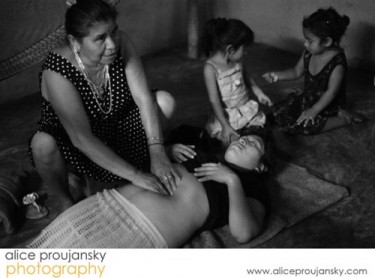Intercultural Midwifery [1] is the topic of this Offbeat Mama [2] guest photo blog post by Brooklyn based photographer Alice Proujansky. While five months pregnant she traveled to photograph a cultural knowledge exchange in Quintana Roo where students from the only government- accredited program in midwifery went to study with Mayan traditional midwives from rural area.
The traditional midwives shared their knowledge on practices common to them such as uterine massage while learning from the students how they could handle birth emergencies.
As Alice Proujansky [3] describes on her website where a slideshow of photographs from this trip can be found:
This cultural exchange integrated best practices from indigenous healthcare rooted in traditional, isolated, impoverished regions with professionalized, evidence-based maternity care, and is part of a trend toward embracing midwifery in Mexico.
From her blog post CASA Midwifery Students on a Journey [4]:
After preparing their public health presentations – including hand-sewn model pelvises, breasts and amniotic sacs – the students from CASA midwifery school [5] boarded a run-down bus, ate American cheese and hot pepper sandwiches, and rode 32 hours from their school in San Miguel de Allende to the small city of José Maria Morelos in the Southern state of Quintana Roo. There all 40 students slept on the floor of a classroom at the Universidad Intercultural Maya [6] and gave presentations to local traditional Mayan midwives about prenatal resuscitation, post-partum hemorrhage and other topics. The traditional midwives, who had learned from relatives and practiced for many years, taught the students about home births in hammocks, herbal medicines, and their own approaches to obstetric emergencies and prenatal care.
Also on Ms. Proujansky's website are other documentary series on maternity such as Delivery [7], where photographs show the conditions in a Dominican Republic maternity ward, and Lagos Midwives [8] on how Nigerian midwives provide much needed and welcomed care through a free clinic run by Doctors Without Borders.
Here's an audio slideshow [9] with color images of Lagos Midwives that also includes audio from interviews with midwives in the clinic:
